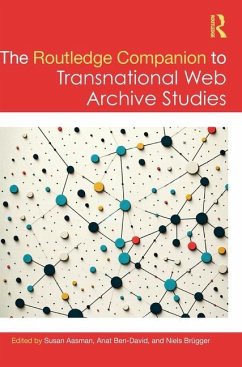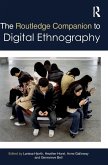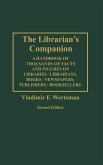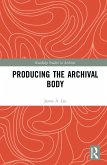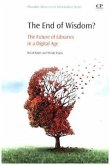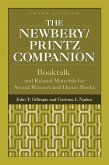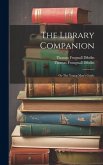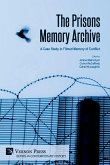The Routledge Companion to Transnational Web Archive Studies
Herausgeber: Ben-David, Anat; Aasman, Susan; Brugger, Niels
The Routledge Companion to Transnational Web Archive Studies
Herausgeber: Ben-David, Anat; Aasman, Susan; Brugger, Niels
- Gebundenes Buch
- Merkliste
- Auf die Merkliste
- Bewerten Bewerten
- Teilen
- Produkt teilen
- Produkterinnerung
- Produkterinnerung
The Routledge Companion to Transnational Web Archive Studies explores the untapped potential of web archives for researching transnational digital history and communication. It covers cross-border, cross-collection, and cross-institutional examination of web archives on a global scale.
Andere Kunden interessierten sich auch für
![The Routledge Companion to Digital Ethnography The Routledge Companion to Digital Ethnography]() The Routledge Companion to Digital Ethnography354,99 €
The Routledge Companion to Digital Ethnography354,99 €![The Librarian's Companion The Librarian's Companion]() Vladimir F. WertsmanThe Librarian's Companion105,99 €
Vladimir F. WertsmanThe Librarian's Companion105,99 €![Producing the Archival Body Producing the Archival Body]() Jamie A. LeeProducing the Archival Body195,99 €
Jamie A. LeeProducing the Archival Body195,99 €![The End of Wisdom? The End of Wisdom?]() The End of Wisdom?45,99 €
The End of Wisdom?45,99 €![The Newbery/Printz Companion The Newbery/Printz Companion]() John GillespieThe Newbery/Printz Companion99,99 €
John GillespieThe Newbery/Printz Companion99,99 €![The Library Companion The Library Companion]() Thomas Frognall DibdinThe Library Companion43,99 €
Thomas Frognall DibdinThe Library Companion43,99 €![The Prisons Memory Archive The Prisons Memory Archive]() The Prisons Memory Archive52,99 €
The Prisons Memory Archive52,99 €-
-
-
The Routledge Companion to Transnational Web Archive Studies explores the untapped potential of web archives for researching transnational digital history and communication. It covers cross-border, cross-collection, and cross-institutional examination of web archives on a global scale.
Hinweis: Dieser Artikel kann nur an eine deutsche Lieferadresse ausgeliefert werden.
Hinweis: Dieser Artikel kann nur an eine deutsche Lieferadresse ausgeliefert werden.
Produktdetails
- Produktdetails
- Verlag: Taylor & Francis Ltd
- Seitenzahl: 446
- Erscheinungstermin: 28. April 2025
- Englisch
- Abmessung: 246mm x 174mm
- ISBN-13: 9781032497785
- ISBN-10: 1032497785
- Artikelnr.: 71300883
- Herstellerkennzeichnung
- Libri GmbH
- Europaallee 1
- 36244 Bad Hersfeld
- gpsr@libri.de
- Verlag: Taylor & Francis Ltd
- Seitenzahl: 446
- Erscheinungstermin: 28. April 2025
- Englisch
- Abmessung: 246mm x 174mm
- ISBN-13: 9781032497785
- ISBN-10: 1032497785
- Artikelnr.: 71300883
- Herstellerkennzeichnung
- Libri GmbH
- Europaallee 1
- 36244 Bad Hersfeld
- gpsr@libri.de
Susan Aasman is Professor in Digital Humanities at the Centre for Media and Journalism Studies at the University of Groningen (The Netherlands). Her expertise is in the field of media history with a focus on digital media and web historiography and the new emerging field of web archaeology. She is interested in private, common, and institutional digital archival practices and discourses. Anat Ben-David is an associate professor of communication at the Open University of Israel. Her research focuses on internet histories, digital technologies, and the intersection of politics and knowledge. Her work in web archive studies critically examines how archival infrastructures and geopolitics shape the web's pasts and explores new methods for advancing critical web archive research. Niels Brügger is Professor at Aarhus University, School of Communication and Culture. His research interests are web historiography, web archiving, and media theory. Within these fields, he has authored a number of publications, including Web 25: Histories from the first 25 years of the World Wide Web (Ed.; Peter Lang, 2017), and The archived web: Doing history in the digital age (MIT Press, 2018).
Lists of figures; List of maps; List of tables; List of contributors; 1
Introducing transnational web archive studies; 2 'History web', 'web
history', and 'history of the web': Three subfields and why (and why not)
integrating them; 3 Iconography in flux: A transnational exploration of the
evolution of climate news imagery through the Wayback Machine; 4 Comparing
the holdings of closed national web archives through summaries; 5 Exploring
the evolution of .lu domain names through a transnational comparison:
Similarities and differences between .lu and .dk; 6 Comparing national web
domains across national web archives: Methodological and practical
challenges of doing transnational studies; 7 Conversation 1:
Transnational;8 Oral histories and scalable reading: Analysing born-digital
collecting practices during the COVID-19 pandemic; 9 Surveying the
landscape of COVID-19 web collections in European GLAM institutions: An
explorative analysis; 10 What can we learn from URLs? Understanding the
scope of COVID-19 web archive collections for transnational analyses; 11
The challenges of searching for women in the COVID-19 web archive
collections: Promises, achievements, and pitfalls; 12 Conversation 2:
Events; Part III: Methods and skills in web archive studies - 13
Information ecosystems through the lens of web archives; 14 History of
virtual museums and web archives: Opportunities for rescaling research; 15
Exploring skills and training requirements for the web archiving community;
16 Teaching web archiving in higher education: Best practices and future
perspectives; 17 Conversation 3: Communities; Part IV: Politics of web
archives as collections - 18 The trouble with community: Constructing,
deconstructing and reconstructing transnational "community" micro-archives;
19 An inclusive approach to web archiving: The case of the Middle East and
North African websites in the IIPC Novel Coronavirus collection; 20 The
many lives of WeChat: Curating histories of the web in museum environments;
21 Participation, platforms and cultural heritage: Web archiving
challenges; 22 Building an archive of historical web defacements; 23
Conversation 4: Institutional challenges; Part V: Institutional challenges
- 24 Screens in struggle: From archived web corpus to readable data for
history research; 25 Towards transnational research data management
practices for web archives: Challenges and possibilities; 26 The importance
of legal requirements for web archives studies in Belgian and French law;
27 Public policies, technological infrastructure and uses of web archives
by the Digital Humanities in Brazil; 28 Conversation 5: The future;
Glossary; Index.
Introducing transnational web archive studies; 2 'History web', 'web
history', and 'history of the web': Three subfields and why (and why not)
integrating them; 3 Iconography in flux: A transnational exploration of the
evolution of climate news imagery through the Wayback Machine; 4 Comparing
the holdings of closed national web archives through summaries; 5 Exploring
the evolution of .lu domain names through a transnational comparison:
Similarities and differences between .lu and .dk; 6 Comparing national web
domains across national web archives: Methodological and practical
challenges of doing transnational studies; 7 Conversation 1:
Transnational;8 Oral histories and scalable reading: Analysing born-digital
collecting practices during the COVID-19 pandemic; 9 Surveying the
landscape of COVID-19 web collections in European GLAM institutions: An
explorative analysis; 10 What can we learn from URLs? Understanding the
scope of COVID-19 web archive collections for transnational analyses; 11
The challenges of searching for women in the COVID-19 web archive
collections: Promises, achievements, and pitfalls; 12 Conversation 2:
Events; Part III: Methods and skills in web archive studies - 13
Information ecosystems through the lens of web archives; 14 History of
virtual museums and web archives: Opportunities for rescaling research; 15
Exploring skills and training requirements for the web archiving community;
16 Teaching web archiving in higher education: Best practices and future
perspectives; 17 Conversation 3: Communities; Part IV: Politics of web
archives as collections - 18 The trouble with community: Constructing,
deconstructing and reconstructing transnational "community" micro-archives;
19 An inclusive approach to web archiving: The case of the Middle East and
North African websites in the IIPC Novel Coronavirus collection; 20 The
many lives of WeChat: Curating histories of the web in museum environments;
21 Participation, platforms and cultural heritage: Web archiving
challenges; 22 Building an archive of historical web defacements; 23
Conversation 4: Institutional challenges; Part V: Institutional challenges
- 24 Screens in struggle: From archived web corpus to readable data for
history research; 25 Towards transnational research data management
practices for web archives: Challenges and possibilities; 26 The importance
of legal requirements for web archives studies in Belgian and French law;
27 Public policies, technological infrastructure and uses of web archives
by the Digital Humanities in Brazil; 28 Conversation 5: The future;
Glossary; Index.
Lists of figures; List of maps; List of tables; List of contributors; 1
Introducing transnational web archive studies; 2 'History web', 'web
history', and 'history of the web': Three subfields and why (and why not)
integrating them; 3 Iconography in flux: A transnational exploration of the
evolution of climate news imagery through the Wayback Machine; 4 Comparing
the holdings of closed national web archives through summaries; 5 Exploring
the evolution of .lu domain names through a transnational comparison:
Similarities and differences between .lu and .dk; 6 Comparing national web
domains across national web archives: Methodological and practical
challenges of doing transnational studies; 7 Conversation 1:
Transnational;8 Oral histories and scalable reading: Analysing born-digital
collecting practices during the COVID-19 pandemic; 9 Surveying the
landscape of COVID-19 web collections in European GLAM institutions: An
explorative analysis; 10 What can we learn from URLs? Understanding the
scope of COVID-19 web archive collections for transnational analyses; 11
The challenges of searching for women in the COVID-19 web archive
collections: Promises, achievements, and pitfalls; 12 Conversation 2:
Events; Part III: Methods and skills in web archive studies - 13
Information ecosystems through the lens of web archives; 14 History of
virtual museums and web archives: Opportunities for rescaling research; 15
Exploring skills and training requirements for the web archiving community;
16 Teaching web archiving in higher education: Best practices and future
perspectives; 17 Conversation 3: Communities; Part IV: Politics of web
archives as collections - 18 The trouble with community: Constructing,
deconstructing and reconstructing transnational "community" micro-archives;
19 An inclusive approach to web archiving: The case of the Middle East and
North African websites in the IIPC Novel Coronavirus collection; 20 The
many lives of WeChat: Curating histories of the web in museum environments;
21 Participation, platforms and cultural heritage: Web archiving
challenges; 22 Building an archive of historical web defacements; 23
Conversation 4: Institutional challenges; Part V: Institutional challenges
- 24 Screens in struggle: From archived web corpus to readable data for
history research; 25 Towards transnational research data management
practices for web archives: Challenges and possibilities; 26 The importance
of legal requirements for web archives studies in Belgian and French law;
27 Public policies, technological infrastructure and uses of web archives
by the Digital Humanities in Brazil; 28 Conversation 5: The future;
Glossary; Index.
Introducing transnational web archive studies; 2 'History web', 'web
history', and 'history of the web': Three subfields and why (and why not)
integrating them; 3 Iconography in flux: A transnational exploration of the
evolution of climate news imagery through the Wayback Machine; 4 Comparing
the holdings of closed national web archives through summaries; 5 Exploring
the evolution of .lu domain names through a transnational comparison:
Similarities and differences between .lu and .dk; 6 Comparing national web
domains across national web archives: Methodological and practical
challenges of doing transnational studies; 7 Conversation 1:
Transnational;8 Oral histories and scalable reading: Analysing born-digital
collecting practices during the COVID-19 pandemic; 9 Surveying the
landscape of COVID-19 web collections in European GLAM institutions: An
explorative analysis; 10 What can we learn from URLs? Understanding the
scope of COVID-19 web archive collections for transnational analyses; 11
The challenges of searching for women in the COVID-19 web archive
collections: Promises, achievements, and pitfalls; 12 Conversation 2:
Events; Part III: Methods and skills in web archive studies - 13
Information ecosystems through the lens of web archives; 14 History of
virtual museums and web archives: Opportunities for rescaling research; 15
Exploring skills and training requirements for the web archiving community;
16 Teaching web archiving in higher education: Best practices and future
perspectives; 17 Conversation 3: Communities; Part IV: Politics of web
archives as collections - 18 The trouble with community: Constructing,
deconstructing and reconstructing transnational "community" micro-archives;
19 An inclusive approach to web archiving: The case of the Middle East and
North African websites in the IIPC Novel Coronavirus collection; 20 The
many lives of WeChat: Curating histories of the web in museum environments;
21 Participation, platforms and cultural heritage: Web archiving
challenges; 22 Building an archive of historical web defacements; 23
Conversation 4: Institutional challenges; Part V: Institutional challenges
- 24 Screens in struggle: From archived web corpus to readable data for
history research; 25 Towards transnational research data management
practices for web archives: Challenges and possibilities; 26 The importance
of legal requirements for web archives studies in Belgian and French law;
27 Public policies, technological infrastructure and uses of web archives
by the Digital Humanities in Brazil; 28 Conversation 5: The future;
Glossary; Index.

